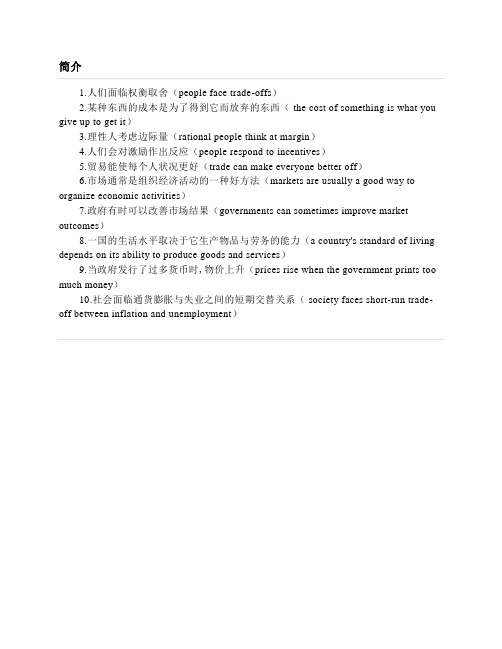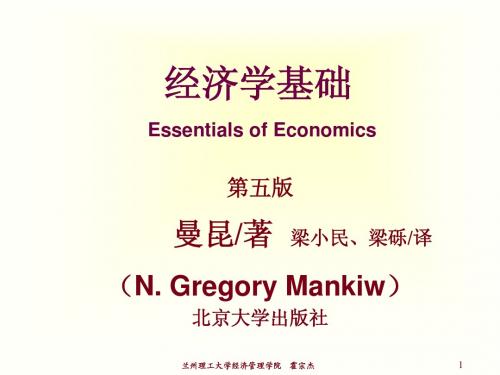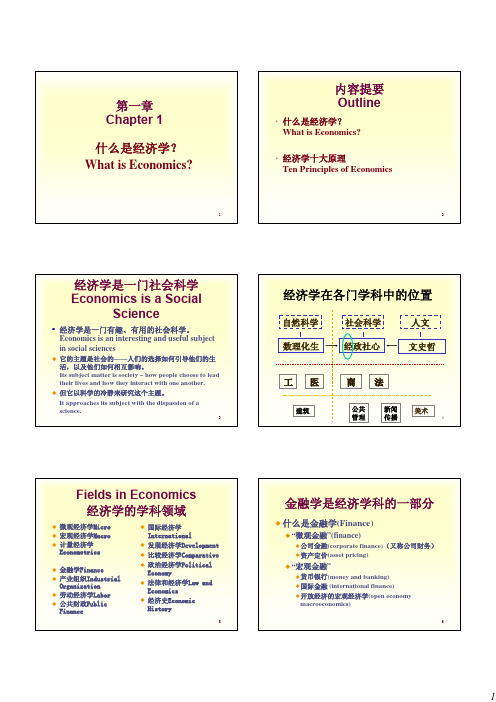Chap_01Ten Principles of Economics经济学十大原理共65页PPT资料
10 Principles of Economics

1.人们面临权衡取舍(people face trade-offs)2.某种东西的成本是为了得到它而放弃的东西( the cost of something is what you give up to get it)3.理性人考虑边际量(rational people think at margin)4.人们会对激励作出反应(people respond to incentives)5.贸易能使每个人状况更好(trade can make everyone better off)6.市场通常是组织经济活动的一种好方法(markets are usually a good way to organize economic activities)7.政府有时可以改善市场结果(governments can sometimes improve market outcomes)8.一国的生活水平取决于它生产物品与劳务的能力(a country's standard of living depends on its ability to produce goods and services)9.当政府发行了过多货币时,物价上升(prices rise when the government prints too much money)10.社会面临通货膨胀与失业之间的短期交替关系( society faces short-run trade-off between inflation and unemployment)原理一:人们面临交替关系原句可理解为“人们面临权衡取舍”当人们组成社会时,他们面临各种不同的权衡取舍。
典型的是在“大炮与黄油”之间的选择。
在现代社会里,同样重要的是清洁的环境和高收入水平之间的权衡取舍。
认识到人们面临权衡取舍本身并没有告诉我们,人们将会或应该做出什么决策。
然而,认识到生活中的权衡取舍是重要的,因为人们只有了解了他们面临的选择,才能做出良好的决策。
Chap01经济学十大原理

兰州理工大学经济管理学院 霍宗杰
29
4. 人们会对激励作出反应。
成本或利益变动时,人们的行为也会改变。 只有当这项行动的边际利益大于边际成本时,
一个理性决策者才会实施该项行动。
兰州理工大学经济管理学院 霍宗杰
30
4. 人们会对激励作出反应。
姚明去上大学读书,就不能
同时到NBA打球,也就不能
4. 人们会对激励作出反应。
兰州理工大学经济管理学院 霍宗杰
20
经济学十大原理
人们如何相互交易
5. 贸易能使每个人状况更好. 6. 市场通常是组织经济活动的一种好方法.
7. 政府有时可以改善市场结果.
兰州理工大学经济管理学院 霍宗杰
21
经济学十大原理
经济如何运行
8. 一国的生活水平取决于它生产物品与劳务的能力 9. 政府发行过多货币时,物价上升
的物品,从经济学角度来看,负的价格意味着卖方向 买方付费。例如清洁工为居民清除垃圾,由于垃圾是 有害物品,可以认为居民是卖方而清洁工则是买方, 为了运走垃圾,居民需要向清洁工付费。
兰州理工大学经济管理学院 霍宗杰
10
免费物品、经济物品和有害物品在经济学中是
相对的,即随着时间、地点和条件的变化,三
兰州理工大学经济管理学院 霍宗杰
35
7.政府有时可以改善市场结果
当市场失灵(market fails)时,政府可以 干预经济,从而促进效率和平等。
兰州理工大学经济管理学院 霍宗杰
36
7.政府有时可以改善市场结果
市场失灵(Market failure):指市
场本身不能有效配置资源的情况。
兰州理工大学经济管理学院 霍宗杰
10. 社会面临通货膨胀与失业之间的短期权衡取舍
Chap_01Ten Principles of Economics经济学十大原理

❖Basic knowledge for our major of business and economics
➢What Is Economics Like Interesting economics: idea Boring economics: technique Useful economics: Alan Greenspan, the chairman of the Fed
➢How to study economics: Attend class Read textbook: guided by teaching Do exercises Rewrite your class notes Consult instructors
➢How to use this textbook Guided by class notes Reorganize the contents in a way friendly to your thinking Read summary in the end of each chapter Checking the glossary in the end of this book Refer to other textbooks
经济一词来源于希腊语,意思 是“管理家庭的人”。
A household and an economy face many decisions:
一个家庭和经济体面临很多决策:
Who will work? 谁去工作? What goods and how many of them should be produced? 应该生产什么物品?应该生产多少?
微观经济学十大原理总结教学教材

Ten Principles of EconomicsWhat Economics Is All AboutScarcity: the limited nature of society’s resources(稀缺性:社会资源的有限性)Economics: the study of how society manages its scarce resources(经济学:研究社会如何管理自己的稀缺资源)how people decide what to buy,how much to work, save, and spendhow firms decide how much to produce,how many workers to hirehow society decides how to divide its resources between national defense, consumer goods, protecting the environment, and other needs*The principles of :HOW PEOPLE MAKE DECISIONSPRINCIPLE #1: People Face Tradeoffs(原理一:人们要面临权衡取舍)All decisions involve tradeoffs.(所有的选择都包含权衡取舍)Going to a party the night before your midterm leaves less time for studying.Having more money to buy stuff requires working longer hours,which leaves less time for leisure.Protecting the environment requires resources that could otherwise be used to produce consumer goods.Society faces an important tradeoff: efficiency vs. equality (社会面临着一个重要的取舍:效率与平等)Efficiency: when society gets the most from its scarce Resources(效率:社会能从其稀缺资源中得到的最大利益)Equality: when prosperity is distributed uniformly among society’s members(平等:社会成果在社会成员中的平均分配)Tradeoff: To achieve greater equality, could redistribute income from wealthy to poor. But this reduces incentive to work and produce, shrinks the size of the economic “pie.”(权衡取舍:为了实现更好地平等,将收入从富人到穷人重新分配。
1 - Ten Principles of Economics

曼昆微观经济学英文版01ten_principles

TEN PRINCIPLES OF ECONOMICS
• How people make decisions.
• People face tradeoffs. • The cost of something is what you give up to get it. • Rational people think at the margin. • People respond to incentives.
Making decisions requires trading off one goal against another.
Copyright © 2004 South-Western/Thomson Learning
Principle #1: People Face Tradeoffs • Efficiency v. Equity
• The standard of living depends on a country’s production.
• Prices rise when the government prints too much money.
• Society faces a short-run tradeoff between inflation and unemployment.
Copyright © 2004 South-Western/Thomson Learning
Principle #3: Rational People Think at the Margin. • Marginal changes are small, incremental
adjustments to an existing plan of action.
钱颖一经济学原理

经济学在各门学科中的位置
自然科学 数理化生 社会科学 经政社心 人文 文史哲
它的主题是社会的——人们的选择如何引导他们的生 活,以及他们如何相互影响。 Its subject matter is society – how people choose to lead their lives and how they interact with one another. 但它以科学的冷静来研究这个主题。 It approaches its subject with the dispassion of a science.
3
工
建筑
医
商
公共 管理
法
新闻 传播 美术
4
Fields in Economics 经济学的学科领域
金融学是经济学科的一部分
什么是金融学(Finance)
“微观金融”(finance)
公司金融(corporate 资产定价(asset
微观经济学Micro 宏观经济学Macro 计量经济学 Econometrics 金融学Finance 产业组织Industrial Organization 劳动经济学Labor 公共财政Public Finance
22
经济学的十个原理
人们如何相互作用 How People Interact
5. 贸易能使人人收益。 Trade can make everyone better off. 6. 市场通常是组织经济活动的好方式。 Markets are usually a good way to organize economic activity. 7. 政府有时可以改进市场结果。 Governments can sometimes improve market outcomes.
曼昆版微观经济学 西方经济学

Answers
1:
Cost of fixing transmission = $600
A. Blue book value is $6500 if transmission works, $5700 if it doesn’t
Benefit of fixing the transmission = $800 ($6500 – 5700).
society’s members
Tradeoff: To increase equity, can redistribute
income from the well-off to the poor. But this reduces the incentive to work and produce, and shrinks the size of the economic “pie.”
Society faces an important tradeoff:
efficiency vs. equity
efficiency: getting the most out of scarce
resources
equity: distributing prosperity fairly among
CHAPTER 1
TEN PRINCIPLES OF ECONOMICS
6
HOW PEOPLE MAKE DECISIONS
Principle #2: The Cost of Something Is What You Give Up to Get It
Examples: The opportunity cost of…
A. Blue book value is $6500 if transmission works, $5700 if it doesn’t
- 1、下载文档前请自行甄别文档内容的完整性,平台不提供额外的编辑、内容补充、找答案等附加服务。
- 2、"仅部分预览"的文档,不可在线预览部分如存在完整性等问题,可反馈申请退款(可完整预览的文档不适用该条件!)。
- 3、如文档侵犯您的权益,请联系客服反馈,我们会尽快为您处理(人工客服工作时间:9:00-18:30)。
Why do we study economics?
Understand the way the world works: An useful perspective to explain various events, including economic policies
Develop rational thinking, guiding us to make correct individual decision
经济一词来源于希腊语,意思 是“管理家庭的人”。
A household and an economy face many decisions:
一个家庭和经济体面临很多决策:
Who will work? 谁去工作?
What goods and how many of them should be produced? 应该生产什么物品?应该生产多少?
Make consistent judgments on economic phenomena
Basic knowledge for our major of business and economics
What Is Economics Like Interesting economics: idea Boring economics: technique Useful economics: Alan Greenspan, the chairman of the Fed
Economics 经济学
Society and Scarce Resources: 社会和稀缺资源:
The management of society’s resources is important because resources are scarce. 因为资源是稀缺的,所以社会资 源的管理就很重要。
Scarcity . . . 稀缺…Biblioteka Course Policy
Attending class is strongly recommended, although not required
English is required when writing final exam
Final grade comes mainly from your performance in final exam. Session tests or mid term tests are also counted.
Reference Textbooks Paul Samuelson and William :Economics J. Stiglitz: Economics
Good examples William Baumol and Alan Blinder:
Economics: Principles and Policy
A household and an economy face many decisions:
一个家庭和经济体面临很多决策:
What resources should be used in production? 应该用什么资源生产?
At what price should the goods be sold? 物品的销售价格应该是多少?
Principles of Economics
Third Edition by
N. Gregory Mankiw
经济学原理
(第三版)
Brief Description About This Course
What do we mean by Western Economics?
Western economics versus Marxism Economics (political economy)
Economics (in general) A useful definition
Economics is the study of how a society allocates scarce resources among alternative uses to satisfy human wants Basic Principle in this course
. . . means that society has limited resources and therefore cannot produce all the goods and services people wish to have. …意思是说,社会拥有有限的资源,不 能生产出人们想要的所有物品与劳务。
You are required to apply economics to explain various economic phenomena
Ten Principles of Economics
经济学十大原理
Chapter 1
Economy. . . 经济…
. . . The word economy comes from a Greek word for “one who manages a household.”
How to study economics: Attend class Read textbook: guided by teaching Do exercises Rewrite your class notes Consult instructors
How to use this textbook Guided by class notes Reorganize the contents in a way friendly to your thinking Read summary in the end of each chapter Checking the glossary in the end of this book Refer to other textbooks
